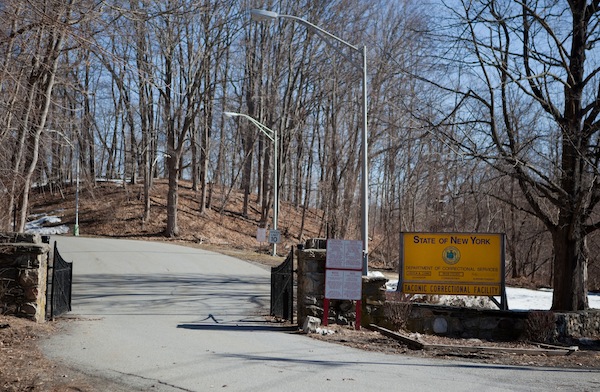
Marc Fader
Entrance to the Taconic Correctional Facility.The New York State legislature has finally reconvened to address Coronavirus-related legislation. While critical matters like tax increases on the wealthy, relief for small businesses and aid to essential workers dominate the agenda, one crisis area needs and is missing robust and consequential action: the spread of Covid-19 in prisons.
More than 1,700 prison staff and incarcerated people have contracted Covid-19 and 20 have died. Maintaining social distance and staying healthy is impossible in antiquated and crowded prisons. Yet elected officials have turned a blind eye to this ongoing crisis.
The governor has the constitutional power to reduce the prison population by granting clemency. Thousands of clemency applications have been filed but the governor has declined to commute a single person’s sentence.
There is, however, a bill that has been gathering support in the legislature and could help achieve meaningful reduction in the prison population: the Elder Parole Bill. The bill provides that if you are at least 55 years old and have served at least 15 years, you will have the opportunity to see the Parole Board and make your case for release. Given the board’s historically low release rates, the bill is hardly a guarantee of parole. Instead, it simply offers an opportunity for people to persuade the board that they meet statutory and regulatory requirements and can safely be returned home.
 CityViews are readers’ opinions, not those of City Limits. Add your voice today!
CityViews are readers’ opinions, not those of City Limits. Add your voice today!
The Elder Parole Bill was introduced before anyone heard of the coronavirus. It is based on the reality that people age out of crime and that prisons hold many elders who have served decades marked by robust evidence of achievement, transformation and redemption. Today, the bill is even more critical as these same older people are at-risk of serious complications or dying from Covid-19.
Unlike New York State, the federal government has taken steps that can reduce the federal prison population. Federal legislation via the First Step Act allows more room for home confinement or compassionate release. While the ultimate determination whether to release someone to home confinement rests with the Bureau of Prisons, people seeking compassionate release can appeal to a judge if they are denied relief by the Bureau of Prisons.
Further, and in contrast to New York State Attorney General’s silence on the need to reduce the prison population, United States Attorney General William Barr cited the pandemic as a reason to release prisoners. In a memo last month, he directed the Bureau of Prisons to maximize release of those most at-risk from Covid-19.
And while the Bureau of Prisons has taken a miserly approach to home confinement, federal judges across the country have been using their statutory power to order compassionate release. Earlier this month, District Court Judge Michael Shea ordered federal prison officials in Connecticut to expedite requests for compassionate release. Among the reasons cited by Judge Shea for his ruling were delayed access to medical treatment, and the impossibility of social distancing in the prison’s separate facilities. These factors also describe conditions in New York’s labyrinth of 50 state prisons.
Not surprisingly, many of the beneficiaries of home confinement and judicial compassionate release on the federal level were people convicted of high-profile political crimes, like Paul Manafort, Donald Trump’s former campaign chairman, Michael Cohen, Trump’s former personal lawyer and fixer, and Dean Skelos, former New York State Senate Majority Leader. Recently, and ironically, lawyers for Joseph Percoco, Governor Cuomo’s former top aide, sought to have him released to home confinement.
While all the people named above had a route by which to seek release from federal prisons, there is no such path for the 40,000 plus people in New York State prisons. The Elder Parole Bill is one relatively small way to provide such a path for a select group of people. It is not hyperbole to say that passing the bill is a matter of life and death.
Steven Zeidman is a professor of law at CUNY School of Law. He is on Twitter @SteveZeidman.








One thought on “Opinion: Legislature Must Address the COVID Threat to People in Prison”
Inmates all across the country,male and female need to be released. They’re in an impossible situation. There’s nothing they can do to protect themself. Can u imagine sitting and waiting on something that’s likely to kill u. Like waiting on that train to hit u,might hit u and might not.